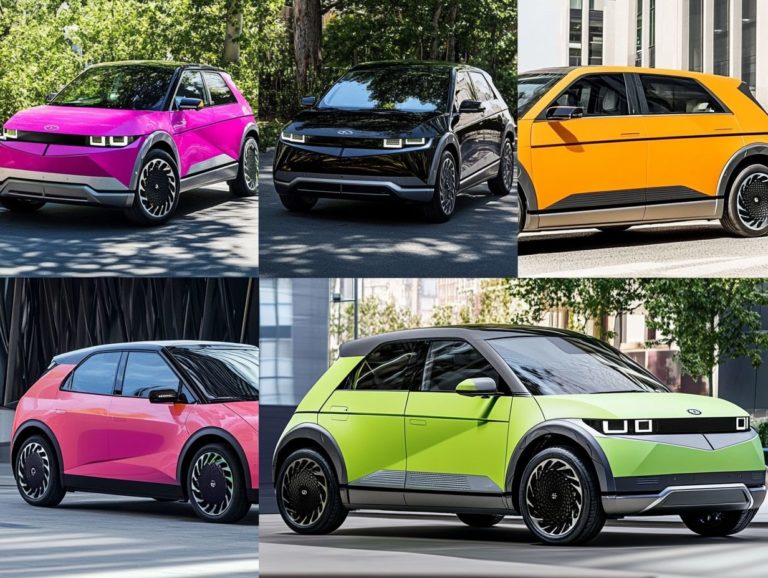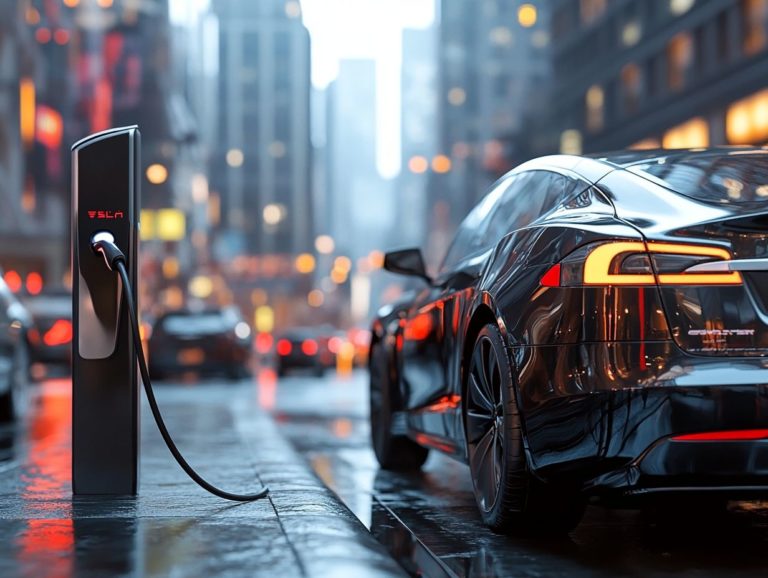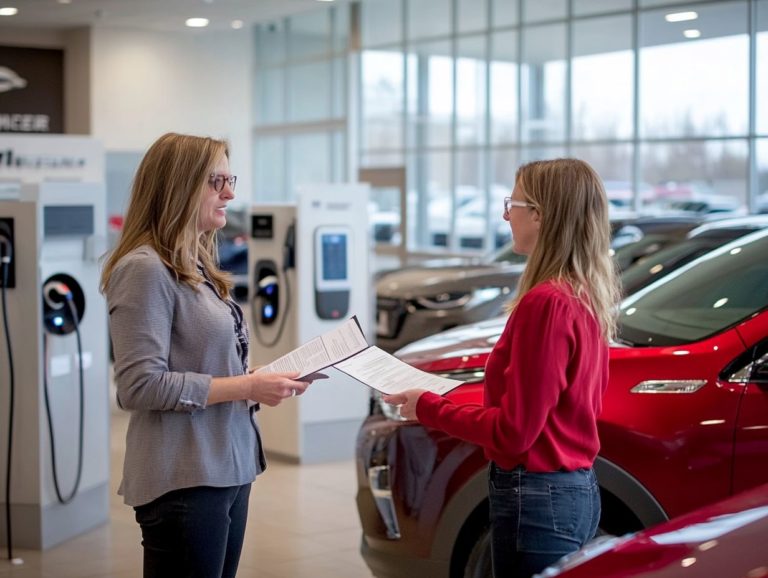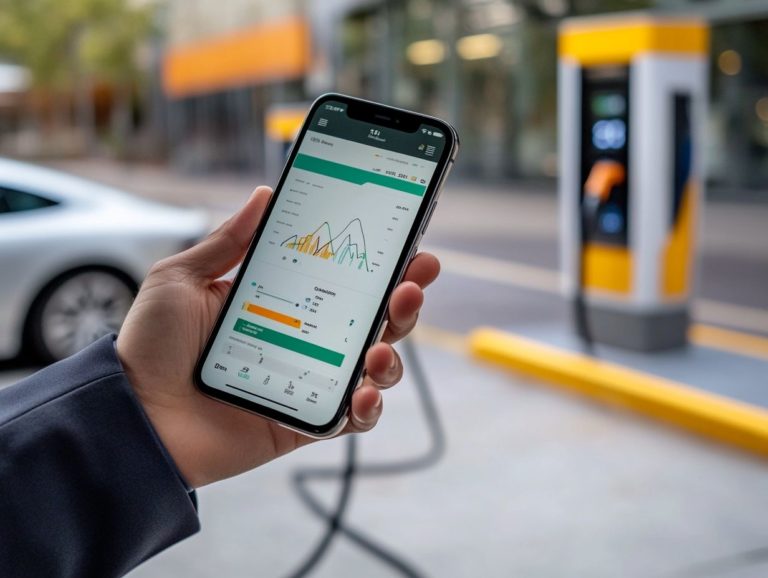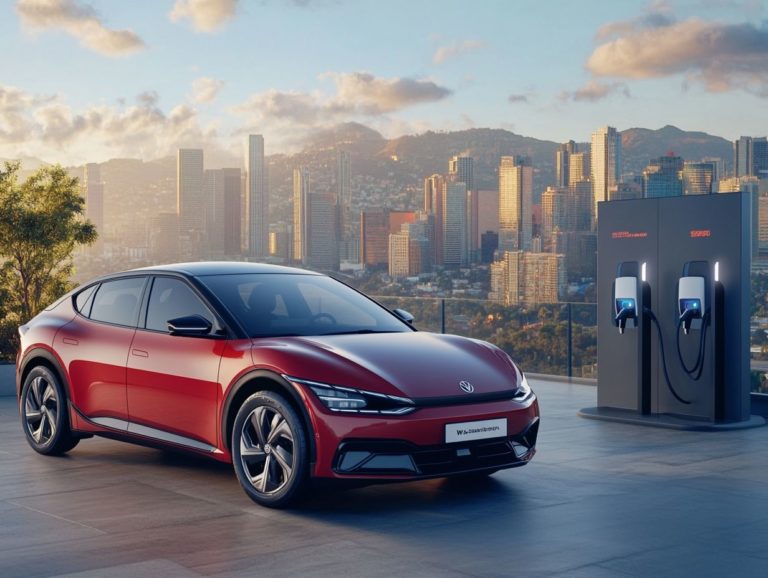The Ultimate Checklist for EV Buyers
Considering an electric vehicle (EV) is a thrilling leap toward a more sustainable future. However, the decision-making process can feel daunting.
With a multitude of options and factors to weigh, it’s crucial for you to approach your purchase with a structured plan.
This checklist distills everything you need to know, guiding you through budgeting, research, test-driving, and ultimately finalizing your purchase.
Whether you re a seasoned EV aficionado or just starting to explore the possibilities, this guide will equip you with the knowledge to make informed choices and drive away in the ideal electric car.
Contents
- Key Takeaways:
- The Ultimate Checklist for EV Buyers
- 1. Determine Your Budget
- 2. Research Available Incentives and Tax Credits
- 3. Consider Your Driving Habits
- 4. Choose the Right Type of Electric Vehicle
- 5. Research Charging Options
- 6. Check for Available Charging Stations in Your Area
- 7. Look Into Maintenance and Repair Costs
- 8. Consider the Resale Value of Electric Vehicles
- 9. Test Drive Different Models
- 10. Consider Insurance Costs
- 11. Look Into Warranty and Battery Life
- 12. Research the Brand’s Reputation and Customer Reviews
- 13. Determine If You Need Additional Features
- 14. Compare Prices and Negotiate
- 15. Finalize Your Purchase and Enjoy Your Electric Vehicle!
- Frequently Asked Questions
- What is the Ultimate Checklist for EV Buyers?
- Why is it important to have a checklist when buying an EV?
- What are some key items that should be on the Ultimate Checklist for EV Buyers?
- How can the Ultimate Checklist for EV Buyers help me save money?
- Is the Ultimate Checklist for EV Buyers suitable for all types of EV buyers?
- How can I access the Reference Data for the Ultimate Checklist for EV Buyers?
Key Takeaways:
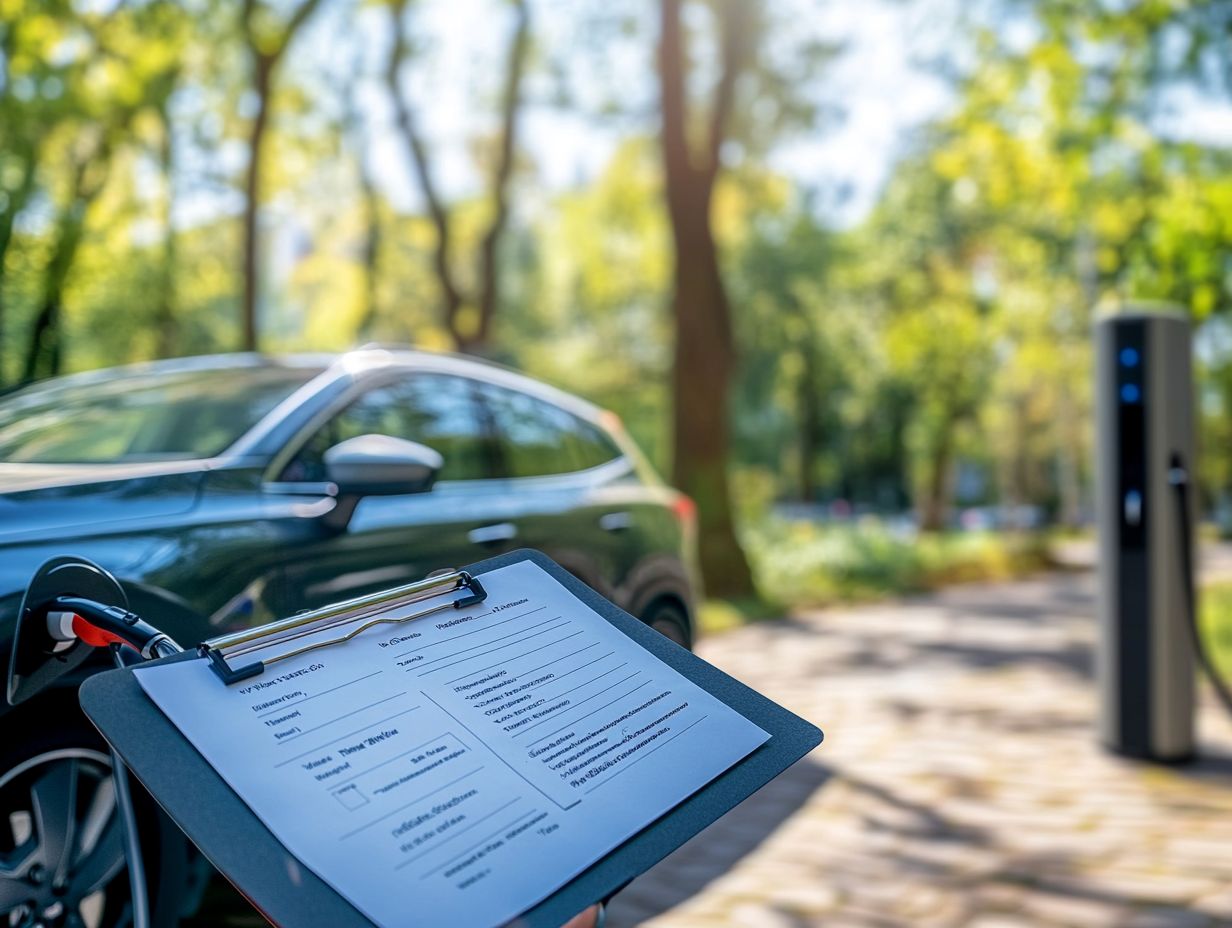
- Determine your budget and research available incentives and tax credits to help lower the cost of your electric vehicle.
- Consider your driving habits and choose the right type of electric vehicle that fits your lifestyle and needs.
- Thoroughly research charging options, maintenance and repair costs, resale value, and test drive different models before finalizing your purchase.
The Ultimate Checklist for EV Buyers
Purchasing an electric vehicle (EV) can indeed be a transformative choice. It influences not only your driving experience but also aligns with your financial priorities and environmental beliefs. To ensure you make an informed decision, it s essential to follow a comprehensive checklist tailored specifically to your driving needs, budget, and available charging options.
With various models on the market, including battery electric vehicles and plug-in hybrids, understanding the main points of EV ownership such as range anxiety (the fear of running out of battery charge before reaching a charging station), charging station accessibility, and maintenance costs becomes vital.
This guide aims to help you navigate the complexities of the EV market, ensuring you discover the perfect vehicle that suits your driving preferences and lifestyle demands.
Taking the time to evaluate your personal driving habits can significantly impact your decision-making process. Your daily commutes and trip lengths will dictate the most suitable EV ranges for you. Familiarizing yourself with the various EV models available allows you to gain a deeper understanding of features, performance, and reliability, ultimately helping you tailor your options to fit your specific preferences.
Financial incentives, like tax credits and rebates, play a crucial role in your decision. They offer substantial savings that can ease the purchase costs. Exploring diverse charging solutions ranging from home installations to public networks alongside potential savings from choosing electric alternatives can significantly reduce your overall costs. This will provide you with a well-rounded perspective, ultimately leading to a more satisfying ownership experience.
1. Determine Your Budget
Determining your budget is a crucial first step in the electric vehicle (EV) buying process. It directly impacts your options and overall financial considerations throughout your journey as an EV owner.
When evaluating budget constraints, several factors come into play. Start with the initial purchase price of vehicle models, which can vary significantly. While some high-end options carry a hefty sticker price, there are also competitively priced models that deliver exceptional value.
Don’t overlook ongoing maintenance costs. Electric vehicles typically have fewer moving parts, which translates to lower maintenance expenses for you. The potential savings from reduced fueling costs and greater energy efficiency can significantly diminish your overall expenditures.
It s wise to factor in available tax credits, as these can ease some of the financial burden. This makes the transition to an EV not only feasible but also far less intimidating.
Get ready to embrace an amazing electric future!
2. Research Available Incentives and Tax Credits
Exploring the available incentives and tax credits is crucial for maximizing your investment in an electric vehicle (EV). These financial benefits can significantly lower your overall cost of ownership.
Both federal and state governments offer various programs designed to make EV adoption more accessible. Notably, the Inflation Reduction Act presents substantial tax credits for both new and used electric vehicles, potentially saving you thousands of dollars.
Programs from the U.S. Department of Energy often provide rebates for charging station installations, further cutting down your long-term expenses. Keep in mind that eligibility criteria typically include income thresholds, specific vehicle models, and residency requirements. These criteria are tailored to ensure a diverse range of consumers can reap the benefits.
By fully taking advantage of these incentives, you can alleviate the initial purchase price and enjoy reduced everyday expenses over time. This makes the prospect of EV ownership even more appealing.
3. Consider Your Driving Habits
Understanding your driving habits is essential when selecting the perfect electric vehicle (EV). It ensures that your choice aligns seamlessly with your unique daily journey needs and preferences.
If you navigate urban streets with frequent stops and shorter trips, a smaller battery EV with efficient energy consumption might be just what you need. However, if you live in the suburbs or plan to embark on long-distance adventures, you’ll want to prioritize features like extended driving range and faster charging capabilities.
The distances you travel and the types of roads you encounter will greatly impact your decision. A robust battery may be necessary for those extended trips, while a compact model could be ideal for city commuting.
Understanding the available charging options and their accessibility is also crucial in making a choice that fits effortlessly into your lifestyle.
4. Choose the Right Type of Electric Vehicle
Finding the perfect electric vehicle (EV) is essential to ensure it aligns with your driving preferences and everyday needs, whether you re leaning towards a battery electric vehicle (an EV that runs solely on electricity) or a plug-in hybrid (which uses both gasoline and electric power).
Battery electric vehicles (BEVs) maximize energy efficiency and often offer driving ranges that exceed 200 miles on a single charge. On the other hand, plug-in hybrids allow you to drive short distances on battery power alone while relying on fuel for longer trips.
Evaluating your personal driving habits is critical. If you frequently embark on extended journeys, a plug-in hybrid might feel more practical. Conversely, if you re an urban commuter, the convenience of a BEV could be more beneficial.
Considering the availability of charging infrastructure like home charging stations or community charging points can greatly influence which option suits your lifestyle best.
5. Research Charging Options
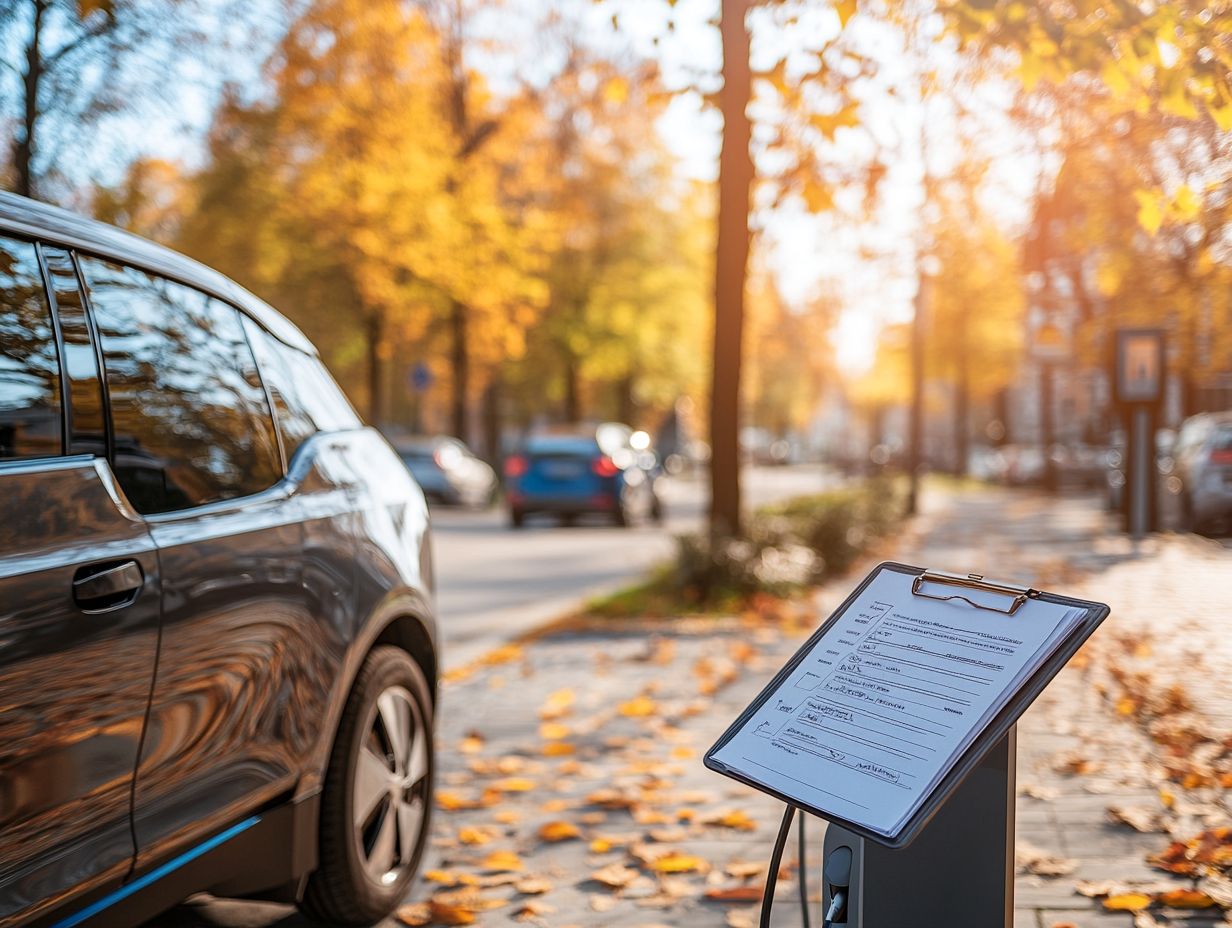
Researching your charging options is a crucial step in preparing for electric vehicle (EV) ownership. It profoundly influences your overall driving experience and convenience.
Understanding the different types of charging setups can transform how and when you charge your vehicle. Many EV owners choose home charging installations, allowing them the luxury of recharging overnight.
However, exploring public charging stations is equally important, especially for longer journeys. These stations offer a range of charging levels, from rapid charging for quick top-ups to slower options typically found at shopping centers or workplaces.
By grasping these various charging alternatives, you can confidently manage your driving distances while accommodating your daily commuting needs. This ensures a seamless transition to electric mobility.
6. Check for Available Charging Stations in Your Area
Don t let range anxiety hold you back check for available charging stations in your area. This is a crucial step to ensure that your electric vehicle (EV) integrates smoothly into your lifestyle.
To navigate this journey, using EV databases and mobile applications can be immensely beneficial. These tools pinpoint where you can find available charging stations and show you user ratings for a reliable experience.
In urban environments, having easy access to public charging stations is particularly essential. This accessibility directly influences the overall practicality of your electric vehicle, giving you the power to plan trips with confidence and sidestep potential inconveniences all while contributing to a more sustainable future.
7. Look Into Maintenance and Repair Costs
Examining maintenance and repair costs is essential for grasping the total cost of ownership associated with electric vehicles (EVs). These costs can vary quite a bit from traditional vehicles.
While EVs typically come with lower maintenance expenses due to fewer moving parts like the absence of oil changes and a simplified drivetrain their long-term financial advantages are further enhanced by strong battery warranties offered by many manufacturers.
These warranties cover replacement costs and ensure the longevity of the vehicle, boosting its resale value in the process. With parts becoming less expensive and more service centers specializing in electric technology popping up, the overall maintenance burden continues to ease.
If you’re considering making the switch to an electric alternative, understanding these savings is crucial to appreciating the long-term benefits of investing in an EV.
8. Consider the Resale Value of Electric Vehicles
Considering the resale value of electric vehicles (EVs) is crucial for grasping their long-term financial implications and the overall impact on your EV ownership experience.
In this era of rapid technological advancement and a growing preference for eco-friendly options, you likely find yourself checking how different models keep their value over time. Elements such as brand reputation, battery longevity, and the current demand for sustainable alternatives significantly affect resale values.
For example, as more consumers become savvy about the benefits of electric vehicles, those models boasting superior range and cutting-edge features may see a noticeable increase in desirability. Government incentives and advancements in charging infrastructure reshape market dynamics, influencing perceptions of value and leading to diverse resale outcomes across different vehicle models.
9. Test Drive Different Models
Get excited by test driving different electric vehicle (EV) models it s a vital step in your journey! This offers you an opportunity to evaluate the driving experience and crucial safety features firsthand.
As you embark on these evaluations, focus on the vehicle s acceleration, handling, and braking responsiveness. Take note of how the seats embrace you and whether the interior technology feels intuitive; these factors can greatly influence your overall satisfaction.
Don t hesitate to explore features like regenerative braking and various driving modes to gauge their impact on performance and energy efficiency. Observe how the EV fits into your lifestyle whether the infotainment system aligns with your needs and how spacious the cabin feels.
These aspects will give you the power to make a well-informed decision that truly reflects your preferences.
10. Consider Insurance Costs
Considering insurance costs is essential when calculating the total cost of ownership for electric vehicles (EVs). These expenses can differ significantly from those associated with traditional vehicles.
Insurance providers assess various factors when evaluating the risks linked to electric vehicle ownership. This assessment affects your premium rates. The vehicle’s value, battery range, and even safety ratings are pivotal in determining how much you will pay.
It’s important to consider the specific model of the electric vehicle. High-performance options often come with steeper premiums due to their higher repair costs and advanced performance capabilities.
With the growing popularity of EVs, many insurance companies are modifying their models to align with the unique characteristics of these vehicles. This signals a notable shift in the automotive insurance landscape.
11. Look Into Warranty and Battery Life
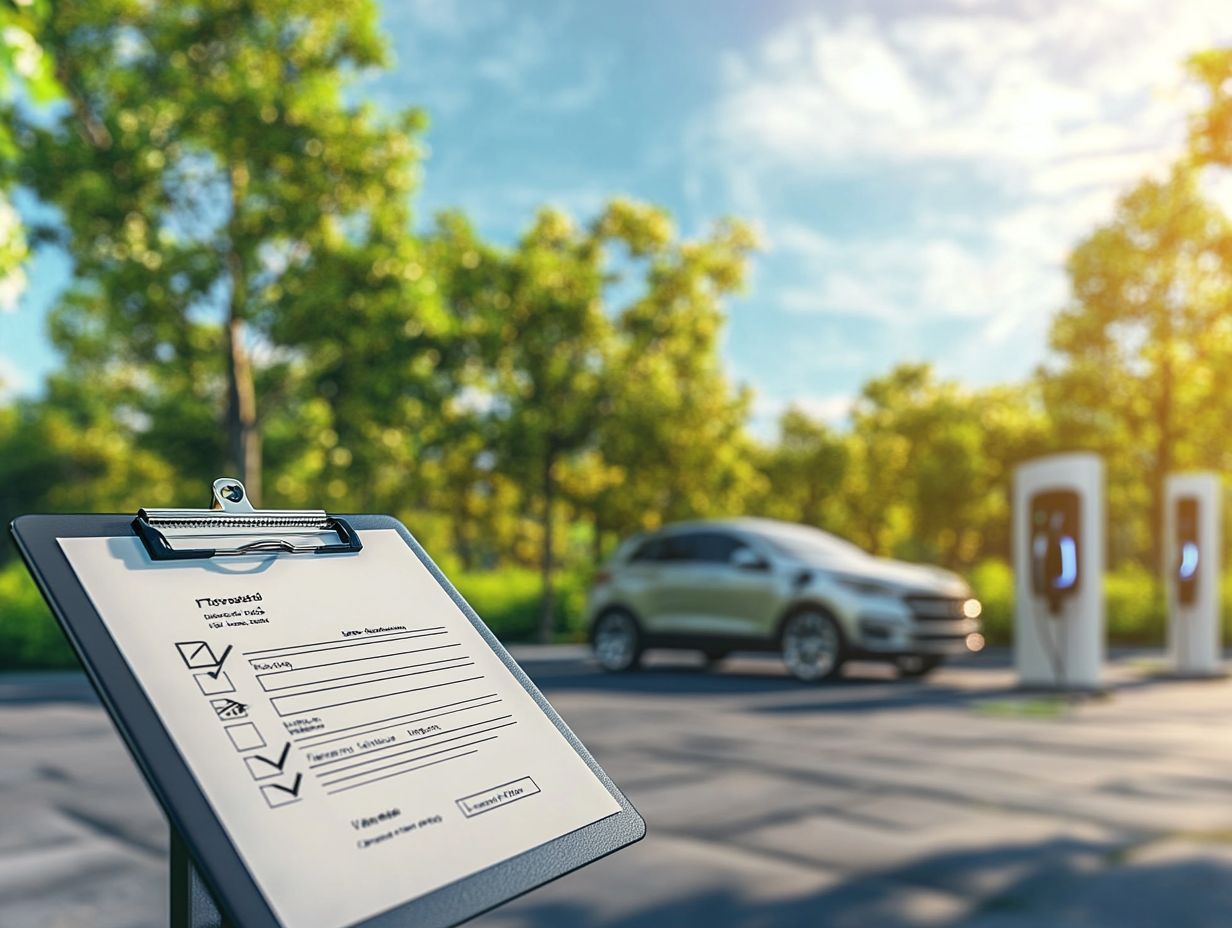
Examining the warranty and battery life is crucial for ensuring your peace of mind when purchasing an electric vehicle (EV). These factors significantly shape your ownership experience.
A comprehensive understanding of the various types of warranties can greatly influence your decision-making process. Most EVs include a standard warranty covering the vehicle’s overall components. However, battery warranties are crucial for your long-term satisfaction.
These warranties guarantee the battery’s performance for a specific number of years or miles usually between 8 to 10 years or up to 100,000 miles, depending on the manufacturer. Some warranties account for a certain percentage of battery capacity loss, which is essential to consider as it affects vehicle performance over time.
The longevity and efficiency of the battery play a vital role in daily performance and the vehicle’s long-term value. A declining battery can lead to reduced range and escalating costs, making this an area worth scrutinizing closely.
12. Research the Brand’s Reputation and Customer Reviews
Researching a brand’s reputation and customer reviews is essential for making an informed decision when selecting your electric vehicle (EV). It provides crucial insights into the reliability and satisfaction levels of various car manufacturers.
With many resources available online, you can easily access databases and platforms dedicated to EVs that compile user feedback and expert analyses. These invaluable databases showcase user experiences, covering everything from overall performance to customer service, offering a comprehensive perspective that goes beyond mere technical specifications.
By carefully examining user reviews, you can understand how well a brand delivers on its promises and identify common issues that may arise. This way, you re investing in more than just a car; you re ensuring an exciting journey ahead!
13. Determine If You Need Additional Features
Determining whether you need additional features in your electric vehicle (EV) can elevate your driving experience. This ensures that your vehicle caters to all your practical and safety requirements.
In today s dynamic automotive landscape, incorporating advanced safety features like lane-keeping assist and automated emergency braking can significantly enhance your confidence on the road. Technology integrations, such as smartphone connectivity through Apple CarPlay or Android Auto, provide intuitive control for navigation and audio, transforming every journey into an enjoyable experience.
By embracing electrification solutions like energy-efficient charging options you can achieve longer ranges while minimizing your environmental footprint.
Evaluating these enhancements allows you to select an EV that not only serves your needs but also resonates with a modern, tech-savvy lifestyle.
14. Compare Prices and Negotiate
Comparing prices and negotiating is a vital stage in your electric vehicle (EV) purchasing journey, giving you the power to make the most of your budget and secure the best deal on your desired model.
To gain a thorough understanding of the market, it s important for you to explore multiple dealerships, both online and in person. Start by gathering price quotes on various models and maintain a detailed record for easy comparison. Utilizing tools like price comparison websites can simplify this process, providing you with valuable insights into the average market price.
Familiarize yourself with the dealer’s pricing incentives and potential trade-in values to enhance your negotiation discussions. When you’re ready to engage, don t hesitate to mention comparable offers from other dealers; this tactic often prompts the seller to offer you better terms, increasing your chances of scoring an exceptional deal.
15. Finalize Your Purchase and Enjoy Your Electric Vehicle!
Finalizing your purchase and transitioning to an electric vehicle (EV) is an exhilarating milestone, marking the beginning of an exciting driving adventure that perfectly aligns with your commitment to sustainable living.
As you revel in this momentous decision, take a moment to consider the essential steps that will elevate your journey. One crucial aspect is setting up home charging, ensuring that your new vehicle is always primed and ready for the road ahead.
Take time to learn about the many features and technologies your EV has to offer, from regenerative braking to customizable driving modes. These elements can genuinely enhance your experience, making every drive more enjoyable.
Frequently Asked Questions
What is the Ultimate Checklist for EV Buyers?
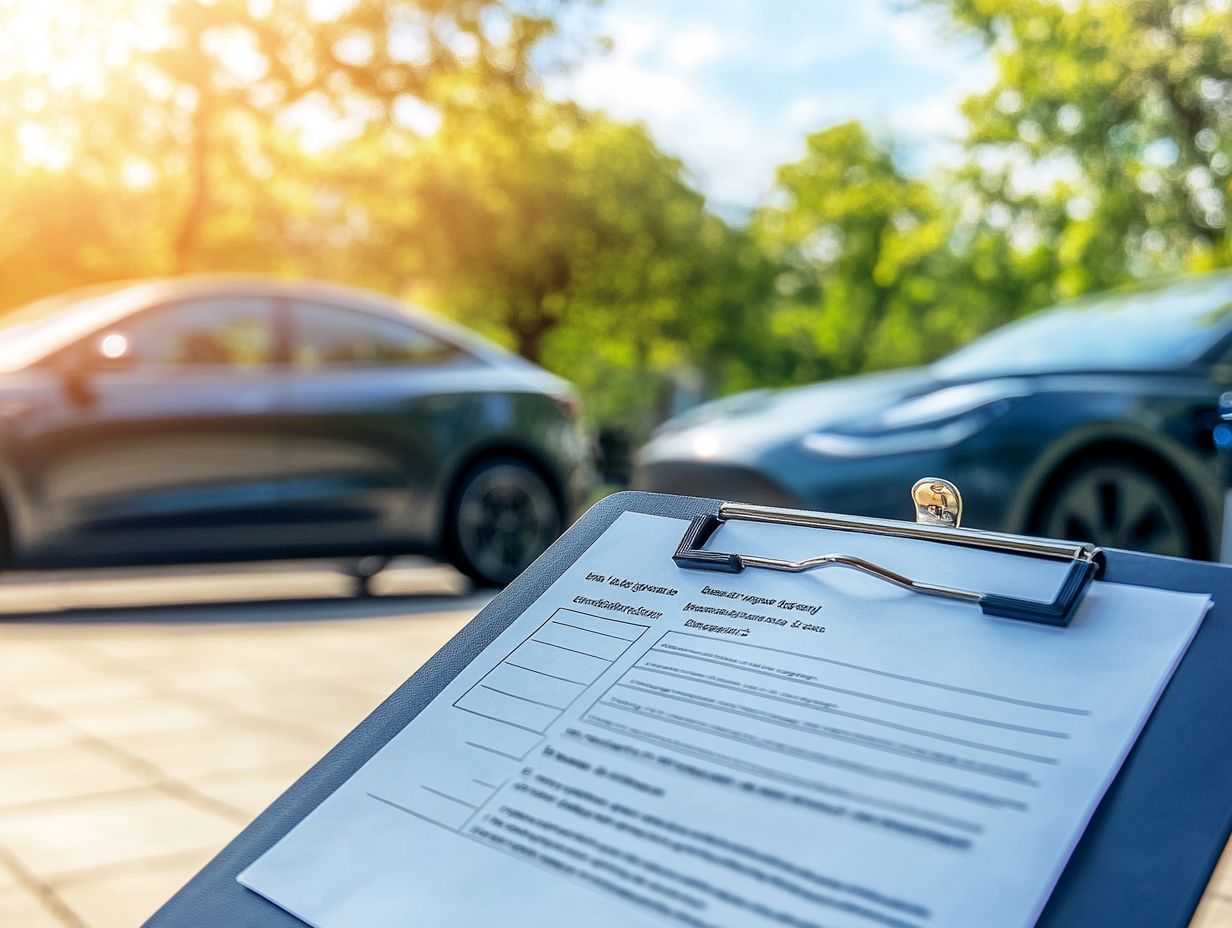
The Ultimate Checklist for EV Buyers is a comprehensive list of all the key factors and considerations that buyers should keep in mind when purchasing an electric vehicle. It covers everything from budget planning to charging infrastructure and maintenance costs, including the top mistakes to avoid.
Why is it important to have a checklist when buying an EV?
Having a checklist ensures that you don’t miss out on any important details when making a big purchase like an electric vehicle. It also helps you make an informed and well-thought-out decision based on your specific needs and priorities.
What are some key items that should be on the Ultimate Checklist for EV Buyers?
- Budget planning
- Range and charging capabilities
- Available tax incentives
- Maintenance costs
- Charging infrastructure in your area
- Your daily commute
- Lifestyle
- Environmental impact
How can the Ultimate Checklist for EV Buyers help me save money?
The Ultimate Checklist for EV Buyers can help you save money by providing a comprehensive overview of all the costs associated with owning an electric vehicle. It can help you compare different models, calculate tax credits, and plan for long-term maintenance and charging costs.
Is the Ultimate Checklist for EV Buyers suitable for all types of EV buyers?
Yes, the Ultimate Checklist for EV Buyers is suitable for all types of buyers, whether you are a first-time EV owner or looking to upgrade to a newer model. It covers all the key aspects that are important to consider, including what to look for when buying an EV.
How can I access the Reference Data for the Ultimate Checklist for EV Buyers?
The Reference Data for the Ultimate Checklist for EV Buyers can be accessed by clicking on the “Reference Data” tab on this webpage. It includes helpful resources and links to assist you in your EV buying journey.
Ready to buy your EV? Start your journey now!

